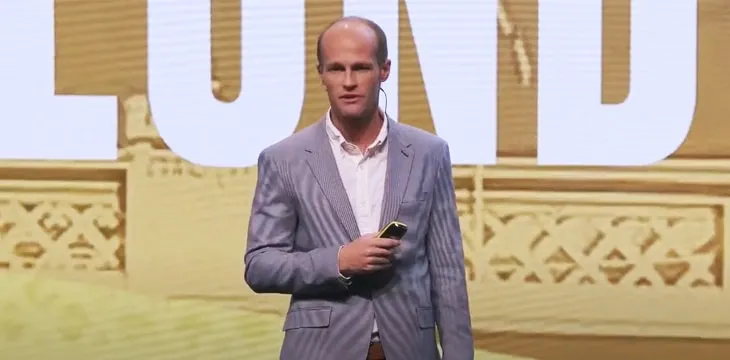|
Getting your Trinity Audio player ready...
|
Few bothered to try to understand Bitcoin in its early days, and some manipulated it to suit their own purposes. Over the years, misunderstanding Bitcoin—deliberately or just misguided—has led to a lot of wasted time, missed opportunities, lost money, and confusion. Money Button founder Ryan X. Charles has made it his mission to find Bitcoin’s true meaning, and educate himself and others. To that end, he and Dr. Craig S. Wright have created the “Theory of Bitcoin” series of very in-depth discussions on both the broader philosophy and finer points of Bitcoin.
We chatted to Charles about why Bitcoin and its creator have been so misunderstood. Bitcoin is both radically new and yet timeless, and to build something truly worthwhile, it helps to understand which parts of its nature fall into those categories.
That said, Bitcoin’s true nature isn’t exactly obvious. Charles himself says it wasn’t until recent years that he began to understanding it better, and even now it would take him the rest of his life to master it.
One key to understanding Bitcoin is, you need to learn a lot more than just Bitcoin. A proper classical education with all the history, accumulated human knowledge and guiding principles it provides is rare these day. But it’s not impossible.
Educate yourself, and you’ll begin to understand the “why” of Bitcoin as much as the “what.” And you’ll also realize that the “why” was probably the most important thing all along.
If you’re reading this article then you’re already on the right track, and that’s an advantage. Charles has written a lengthy blog post about what he’s learned so far, and why it’s important, but read on to hear a little more about where he thinks Bitcoiners went wrong and why, and how they can fix it.
Interview with Ryan X. Charles, Money Button CEO/founder and co-host, “Theory of Bitcoin” series
Do you think there’s a difference between Craig Wright the public figure, and Craig Wright the person? If yes, what is it?
Yes. Many people in the cryptocurrency industry have an interest that is in opposition to the Craig’s original vision for Bitcoin. They have done a good job using Craig’s weaknesses against him in order to create an image that suits their interests. Craig’s weaknesses are essentially that he is not good at interacting with people (although he is getting better). They have taken snapshots of Craig’s public failures, like his faux pas about Rwanda, “I have more money than your country,” and use it against him over and over. But the real Craig Wright is nothing like this public image. The real Craig Wright is a hyperfocused knowledge geek who obsessively tries to learn everything and who is generous with his time with people who help him.
Are all the people working in “crypto” or “blockchain” outside the BSV world actually wasting their time and energy?
Yes. Every single one that is not BSV has limitations that will prevent them from achieving mass adoption. The only one that has a chance is BSV.
How much of the “other 99%” of Bitcoin do you feel you understand, at the present time?
I’m not sure, but I will say that I have learned immensely by talking with Craig in this interview series. In every single interview I learned something important that grew my understanding of Bitcoin, and many other subjects as well. I estimate that it will take about five to ten years to master the most important background material for Bitcoin. I believe it will take the rest of my life to master all of the material.
You said the conversations with Dr. Wright had led to you changing your very definition of Bitcoin. If you could take your knowledge of Bitcoin now, and give it to yourself in 2011, what’s the best advice you would give?
I would tell myself to adopt maximum responsibility for the success of Bitcoin (and for my own success). A key mistake I made early on was to assume that other people would understand the incentives of Bitcoin and would identify and fulfill their niche in the ecosystem. That is not what happened. Instead, almost no one bothered to understand Bitcoin, but rather manipulators got involved who twisted the narrative in a direction of shallow scams and crime. If I had taken responsibility early on to understand Bitcoin completely, and to explain it to people, and to make sure all the components of the ecosystem were filled in properly, we would be substantially further ahead today. I could have prevented the creation of the alternative narrative had I done this back then.
How will your newly-acquired knowledge change your approach to your company, or business in general, from this point on?
My vision has become much bigger but also much more long-term. I used to have fantasies that we would have global success very quickly because people would simply understand Bitcoin and adopt it. However, I now realize that rapid success is unlikely because understanding Bitcoin is difficult and most people aren’t bothering to do so, and so long as they misunderstand the incentives, they will continue to build the wrong things. I can now see how difficult it is to learn Bitcoin and to explain it to people and that this limits the speed with which we can grow. In my new vision, I think global adoption for one use-case, such as tokenized digital assets, is possible in five to ten years, but the full vision for Bitcoin will take several decades to accomplish. This is not unlike the internet.
Do you see your work as a developer/entrepreneur moving in different directions as a result of these conversations?
Yes. Out of necessity I am becoming more focused on learning and teaching. I can be more effective if I can properly explain Bitcoin to a handful of driven entrepreneurs rather than trying to program things myself. My new emphasis is on adopting responsibility for making sure the ecosystem develops properly. This is what I should have done back in 2011.
A classical, broad education is necessary to really understand the world… and Bitcoin. Has this notion disappeared from most universities, or is it still in place?
As best I can tell, the separation between the arts and sciences occurred in the 20th century and has gotten worse with time, and is quite extreme today. Artists don’t know logic and scientists don’t know Shakespeare. This is an educational disaster because people have become substantially less educated and are on average less competent than educated people of a hundred or two hundred years ago. This can be resolved only by the adoption of individual responsibility. You can’t shove knowledge into other people’s minds. They must actively try to learn.
How many books can you read in a week/month?
I can read or listen to up to five books a day, but my average is more like one book every two days. This is much more than most people, but I assure you I do not have any special abilities in this respect. I just like reading and listening to books because I am able to improve my life every day from the knowledge contained within. The most important trick for this I learned from Konstantinos Sgantzos, who said, paraphrasing, “Concentrate on learning things that are useful.” The way I interpret this is that I always and everywhere follow my own curiosity. I stay motivated to learn because it is so useful.
Bitcoin is a more honest system that makes everyone equal under the law. However it appears sometimes that those in power would resist change to the (existing) system they’re able to ‘game’ to their advantage. If this is true, how does Bitcoin overcome any obstacles they may put in place to resist it? Maybe my take is a bit cynical?
People are equal under the law whether Bitcoin exists or not. The elimination of all issues with society can only be accomplished one way, which is with the adoption of maximum responsibility by every individual. So long as people try to blame others for issues, and to take from others so as to give to themselves, then we will have problems. The resolution to this can be facilitated through education. One must start with oneself.
What (if any) special skills are needed to communicate Dr. Wright’s message to the wider public?
I think everyone who is interested in Bitcoin has something unique to offer to help. The interview series is a way that I can uniquely contribute. I would suggest that people ask themselves, “What is the most valuable way I can spend my time?” For some people, part of the answer to that question will involve helping to educate people about Bitcoin. People need to answer this question for themselves.
If the “other 99% of Bitcoin” is something most people don’t know or understand, what’s the best way communicators (like CoinGeek and its contributors) change this?
For CoinGeek specifically, I think you are on the right track with respect to the constant creation and publication of material that markets and explains Bitcoin. However, there is a lot of work to be done to establish the full background material for Bitcoin, and I believe CoinGeek’s content covers only a small fraction of this material. I am not sure what is the best way for CoinGeek to improve this, but I will tell you what I am doing, and this may spark ideas inside CoinGeek. I am using the interview series to frame the full scope of theory that needs to be explained, I am understanding it myself (over years), and I am compiling the information into a structure that will allow me to explain it and pitch it to companies inside Silicon Valley. In the next one to two years, I hope to have fifty or so presentations for every major Silicon Valley company. I believe this holistic and deep approach will be effective at rectifying the misunderstanding of Bitcoin and compelling Silicon Valley to adopt Bitcoin as the base layer of their systems.

 07-02-2025
07-02-2025 





